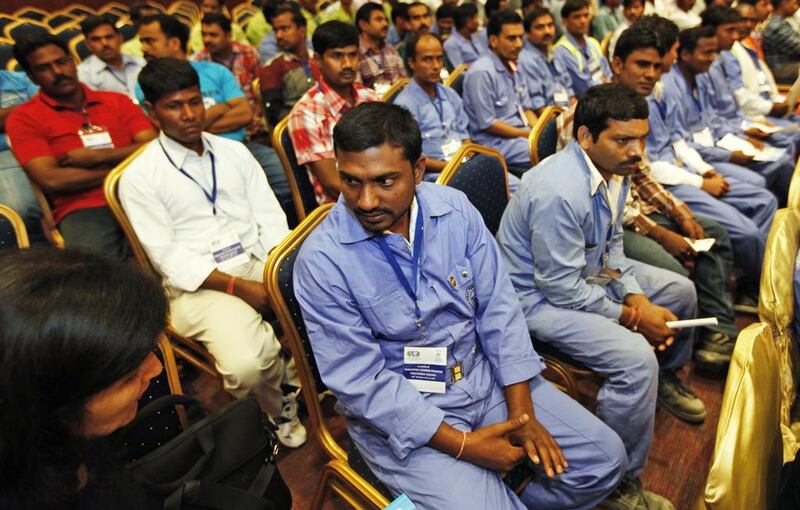DUBAI // Nursing dreams of a secure future for their family, more than 100 Indian construction workers gathered at the official launch of a social security scheme for overseas workers on Monday at the Indian consulate in Dubai.
The UAE was chosen by the Indian government to launch its overseas pension plan – Pension and Life Insurance Fund for Overseas Indian Workers or the Mahatma Gandhi Pravasi Suraksha Yojana – because “it will make a good start here”.
It aims to attract five million blue-collar Indian workers in 17 countries.
For most workers, this was their initiation into saving.
“I am employed now but I realise I must save for myself and my children,” said Bhaskar Chander Bari, an electrician with a construction company.
“I will work in this country as long as I can but then I want to start something of my own in my village.”
Clad in blue and grey overalls, most workers at the launch function yesterday said they earn between Dh600 and Dh1,200 a month and send home up to 70 per cent of their salary each month.
Vayalar Ravi, the minister for overseas Indian affairs who came up with the idea of the project, said it would help workers save towards their pension, for their return home and gain life insurance cover while working abroad.
“It is one of the happiest days for me because I was influenced by workers of this country and their stories; this made me formulate the plan with officers in Delhi,” he said.
“Indian workers rarely accumulate savings and as a result they risk uncertainty in finances when they are not employed. I deliberately selected the UAE for the launch because I know it will make a good start here. We want to provide a social security net, enable workers to systematically save and help them understand that they make a contribution and the government will also contribute.”
The scheme is open to overseas Indian workers who have not completed school beyond grade 10 and who have an “emigration check required” stamp on their passports.
People register by opening an overseas Indian bank account to which they can make a remittance any time and the Indian government will also make a contribution.
The Ministry of Overseas Indian Affairs will contribute 1,000 Indian rupees (Dh60) a year for all subscribers to the scheme who save between 1,000 to 12,000 rupees a year in the pension fund. The ministry will contribute an additional 1,000 rupees for Indian women overseas workers.
Indian ambassadors from Saudi Arabia, Oman and Bahrain were present at the launch. The scheme will shortly be extended to other GCC countries, Mr Ravi said.
MK Lokesh, the Indian ambassador to the UAE, described it as one of the most important events for overseas workers.
“Many workers spend everything they earn and have not much to bank on if they work overseas for only a few years,” he said.
“This will provide them some security. Word will spread through workers’ organisations, businesses and employers to make this scheme widely known.”
Since a soft launch in July in the UAE, 421 workers have been enrolled and documents of 304 others are being processed, said KV Rama Moorthy, the chief executive of the Bank of Baroda’s GCC operations, the lead bank appointed by the Indian government to facilitate the scheme.
“After the official launch and publicity, we expect a huge response,” he said.
“We are conducting regular awareness camps in Abu Dhabi, Dubai, Sharjah and Al Ain by going to different company labour camps. After explaining the scheme we organise question and answer sessions to resolve their queries.”
Sanjay Ram, a plumber, was among those who enrolled after listening in on a session organised at his construction company camp.
“We are working now but then what?” he said.
“We never think about our future and it will be good to start some kind of saving. I have to keep working to look after my family and now I must also keep saving.”
rtalwar@thenational.ae







